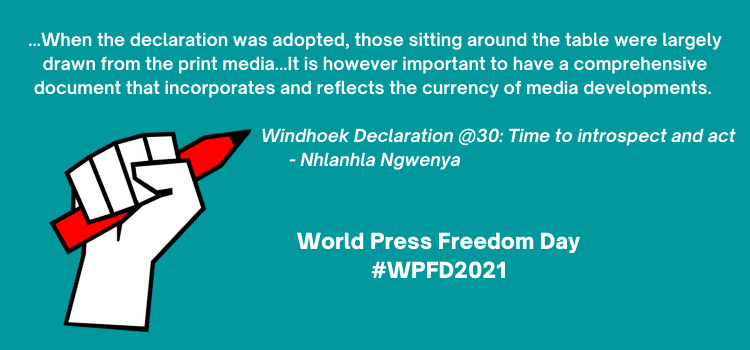Thirty years after the adoption of the Windhoek Declaration, media stakeholders are once again meeting in Namibia, where they seek to update the seminal document that laid the foundation of World Press Freedom Day.
This year’s celebrations are being held under the theme: Information as a Public Good.
The theme is particularly apt as a number of Southern African countries such as Malawi and Zimbabwe have recently enacted access to information laws, while Namibia is in the process of drafting a law that promotes the right to information.
Access to information is an enabling right, as it allows citizens to make informed decisions about how they are governed and about their lives. In that regard, the enactment of access to information laws in the region is commendable.
However, countries like Botswana, Eswatini and Zambia, are yet to enact access to information laws, which in itself is an anathema to democracy.
The past year has been a particularly testing one due to the COVID-19 pandemic. However, this has demonstrated the importance of access to information in fighting the disease and also empowering citizens with adequate information to make informed decisions about their lives and their health.
In this regard, MISA was particularly worried that most regional governments promulgated COVID-19 regulations that had the effect of impinging on freedom of expression and access to information.
At a time when verified information is of utmost importance, regional governments have responded by curtailing access to information and this creates an information void that is filled with misinformation and disinformation.
It is in this context that MISA calls on regional governments that promulgated COVID-19 regulations that have the effect of restricting freedom of expression to present a roadmap upon which the repressive legislation would be reviewed and repealed.
The outbreak of the COVID-19 pandemic witnessed an upsurge in the attacks of journalists, with journalists detained, assaulted, harassed and/or disappeared during the past year.
Mozambican journalist, Ibraimo Mbaruco, remains unaccounted for to this day, more than a year after he was abducted.
His last message to his colleagues was that he was surrounded by soldiers.
In Tanzania, journalist Azory Gwanda has also not been accounted for more than 42 months since he first went missing.
A number of journalists have been arrested in Zimbabwe, while the torture of media student, Tawanda Muchehiwa, who was arrested ostensibly in order to smoke out his uncle, Mduduzi Mathuthu, the editor of ZimLive, is still fresh in the minds.
MISA calls on Southern African governments to account for those who are missing and promote the safety and security of journalists.
In addition, we call on regional governments to work towards ending impunity for crimes against journalists.
Zambia and South Africa hold elections this year and MISA cannot over-emphasise the need for governments to ensure the safety and security of journalists, particularly when there are elections, as tempers tend to rise during such periods.
In addition, there has been a discernible move by Southern African countries to regulate social media and criminalise the publishing of falsehoods.
Such laws are an anathema to democracy and detrimental to the development of the region. The best antidote to false news is the provision of more verified and accurate information, rather than constraining the free flow of information.
Any form of regulation of the internet should be aimed at creating safe online spaces for the exercise and enjoyment of rights as opposed to the criminalisation of online communication under the guise of dealing with internet abuse.
Further, Beginning of 2021, in February, Citizen Lab, a Toronto based research organisation, conducted research on the use of spyware. It detected that there were seven African countries using the Circles spyware to snoop on citizens’ communications. Zimbabwe, Zambia and Botswana, are among the seven African countries from SADC. This is in violation of both domestic laws on the protection of the right to privacy and regional frameworks.
Southern African governments are encouraged to ensure that cybersecurity regulation is informed by the revised principles of the African Commission on Human and Peoples’ Rights (ACHPR) Declaration on Freedom of Expression and Access to Information, which recognises the internet as a fundamental human right.
As we commemorate the 30th anniversary of the Windhoek Declaration, we urge regional governments to reaffirm their commitment to freedom of the media, freedom of expression, observance of digital rights and the right to access to information.
MISA Zimbabwe Regional World Press Freedom day statement 2021









